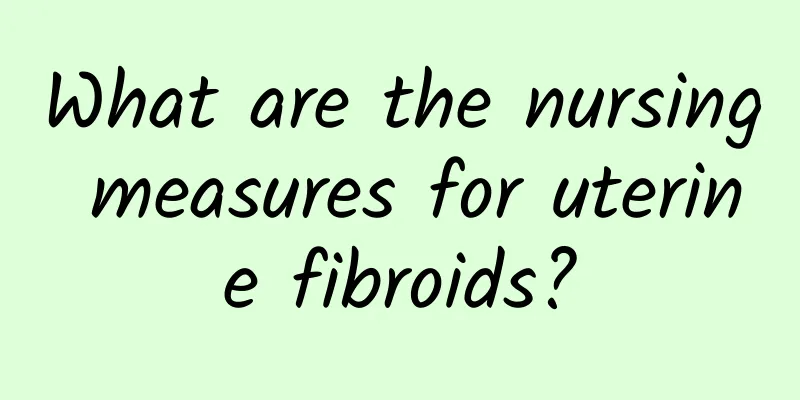What are the nursing measures for uterine fibroids?

|
Uterine fibroids are common benign tumors in women with a high incidence rate. For women with uterine fibroids, nursing care is essential. Scientific care can help patients effectively manage symptoms, relieve pain, and improve their quality of life. This article will discuss in detail the nursing measures for uterine fibroids, hoping to bring a little warmth and help to the majority of patients. Uterine fibroids are benign tumors that originate from the smooth muscle cells of the uterus. Smooth muscle cells are a type of muscle cell in the uterine wall that is responsible for the contraction of the uterus. Fibroids form when these cells grow abnormally. The size, number, and growth rate of uterine fibroids vary from person to person. Some fibroids may be small and cause few symptoms, while others may be large and cause a variety of discomfort. Symptoms of uterine fibroids vary from person to person, depending on the size, location, and number of fibroids. Some common symptoms include: Irregular menstruation: Menstrual periods become longer or shorter, or there is unusual bleeding. Pelvic pain or pressure: Large fibroids may put pressure on surrounding organs, causing pelvic pain or discomfort. Frequent urination: This may put pressure on the bladder, causing frequent urination. Constipation: May compress the rectum, causing constipation. Infertility: Although rare, some fibroids may affect fertility. What are the nursing measures for uterine fibroids? 1. Nutritional conditioning Dietary guidance: Patients are advised to follow a low-fat, high-fiber diet, consume abundant vegetables and fruits, and limit the intake of high-calorie, high-fat foods, such as fried foods and desserts, to maintain weight and health. Patients with uterine fibroids should try to avoid some foods in their daily diet to alleviate symptoms and control the progression of the disease, such as spicy foods such as chili, pepper, garlic, mustard, pepper, ginger, and foods prone to fibroids such as mutton, shrimp, eel, and cuttlefish. At the same time, women with uterine fibroids should not eat foods such as red dates, longan, and donkey-hide gelatin. Eat more whole grains, and eat some dried fruits such as peanuts and melon seeds on a daily basis. Take in foods containing dietary fiber, such as vegetables, to prevent constipation. 2. Drug care Relieve symptoms: For symptoms caused by uterine fibroids, such as abnormal vaginal bleeding and bladder compression, oral contraceptives, painkillers and other drugs can be used to relieve the symptoms, but they must be used under the doctor's advice. Control the progression of the disease: Progesterone drugs can inhibit endometrial hyperplasia, and ovulation-stimulating hormone-releasing hormone drugs can inhibit ovarian function. For some patients with severe symptoms or who have fertility needs, drug treatment is also an effective method. 3. Postoperative Care For patients with obvious symptoms that affect their quality of life and who do not need to retain their uterus, myomectomy or hysterectomy can be chosen; for patients who wish to retain their fertility, myomectomy, uterine artery embolization and other uterus-preserving surgical methods can be considered, and enhanced care is required during the postoperative recovery period. Wound care: The wound needs to be regularly dressed and kept dry and clean after surgery. Pay attention to the wound for bleeding, exudation, etc. If there is any abnormality, report it to the doctor in time. Pay attention to regular vulva cleaning, dry the vulva with a special towel, keep the vulva dry and hygienic, and wash and change underwear frequently. Six hours after surgery, the nursing staff should assist the patient to turn over frequently and let the patient pass gas as soon as possible to prevent postoperative intestinal adhesion. Pain relief: There may be varying degrees of pain after surgery. The doctor will prescribe appropriate painkillers based on the patient's condition. The patient needs to take them on time and in the appropriate dosage, and pay attention to whether there are allergic or adverse reactions. Promote wound healing: Pay attention to eating foods rich in vitamin C and protein to promote wound healing. Avoid eating spicy and irritating foods to avoid affecting wound healing. Avoid strenuous exercise: Avoid strenuous exercise in the early postoperative period to prevent wound dehiscence or bleeding. Appropriate light activities can help promote blood circulation and recovery, but avoid excessive fatigue. Regular follow-up: Regular follow-up after surgery is a necessary step. The doctor will determine the time of the follow-up based on the patient's condition to monitor changes in the condition and wound healing, and adjust the treatment plan in a timely manner. Psychological care: Anxiety, depression and other emotions may occur during the postoperative recovery period. Nurses should provide psychological support to patients, encourage them to actively face the treatment and rehabilitation process, and maintain an optimistic attitude. In short, uterine fibroids are a common gynecological disease. Taking correct nursing measures and cooperating with the doctor's treatment can completely control the patient's condition. As nurses, we should stand in the patient's perspective and provide comprehensive and meticulous nursing services to help patients get out of the shadow of the disease and welcome a better tomorrow. The views in this article are for reference only. Specific nursing measures should also be adjusted according to the patient's individual situation and the doctor's advice. After surgery, patients should actively cooperate with the guidance of doctors and nursing staff, and arrange their lives and diets reasonably to promote recovery. Author: Zhao Xue, People's Hospital of Lingshou County, Shijiazhuang City, Hebei Province |
<<: Do you know? These bad habits are quietly "damaging the kidneys"
>>: Nursing measures for patients with esophageal cancer
Recommend
Blood pressure was 180 when entering the room, and blood oxygen dropped sharply during the operation. This heart failure rescue process is worth discussing
Anesthesia work is like walking a tightrope every...
Will there be discharge as a symptom of threatened miscarriage? What will be secreted
There are many types of symptoms of threatened ab...
What to do if you can't fart after caesarean section
Although cesarean section reduces the pain women ...
This type of cancer is called "cancer that is not cancer", and three high-risk groups must be vigilant!
NO. 1 Pulmonary fibrosis is irreversible and is c...
Can I fertilize Phalaenopsis when it is blooming? How to fertilize Phalaenopsis?
Phalaenopsis is loved by many flower growers for ...
How big is breast fibroid tumor and need surgical removal?
Whether breast fibroadenoma should be surgically ...
How to keep tripe fresh? Tips on how to buy tripe
I believe that careful friends have discovered th...
What is primary cell breast augmentation?
The shape of the breasts has a great impact on th...
What kind of raisins are more delicious? How to distinguish the authenticity of raisin agate
The most important thing about raisins is the app...
Can I drink motherwort granules when I am pregnant?
Of course, you cannot drink Motherwort Granules a...
What causes chest pain in women?
I believe that every girl will encounter breast p...
What are the tips for preventing gynecological diseases?
Regardless of the age of women, they should pay a...
What to eat during menstrual period when the amount of blood is light
Female friends find it difficult to give up their...
How much weight is normal during confinement?
After pregnancy, a girl's weight increases ra...









